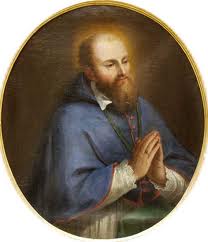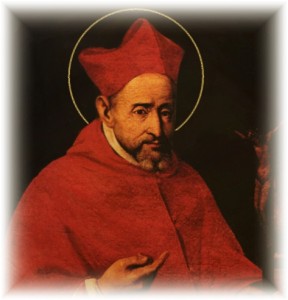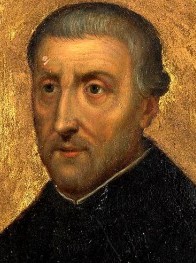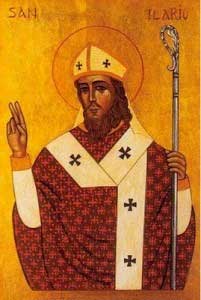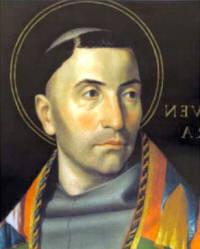VATICAN CITY, 2 MAR 2011 (VIS) – During today’s general audience, which was held in the Paul VI Hall, the Pope spoke about St. Francis de Sales, bishop and doctor of the Church who lived in the sixteenth and seventeenth centuries.
Born in 1567 to a noble family in the Duchy of Savoy, while still very young Francis, “reflecting on the ideas of St. Augustine and St. Thomas Aquinas, underwent a profound crisis which led him to question himself about his own eternal salvation and about the destiny God had in store for him, experiencing the principle theological questions of his time as an authentic spiritual drama“. The saint “found peace in the radical and liberating truth of God’s love: loving Him without asking anything in return and trusting in divine love; this would be the secret of his life”.
Francis de Sales, the Holy Father explained, was ordained a priest in 1593 and consecrated as bishop of Geneva in 1602, “in a period in which the city was a stronghold of Calvinism. … He was an apostle, preacher, writer, man of action and of prayer; committed to realising the ideals of the Council of Trent, and involved in controversies and dialogue with Protestants. Yet, over and above the necessary theological debate, he also experienced the effectiveness of personal relations and of charity”.
With St. Jane Frances de Chantal he founded the Order of the Visitation, characterised “by a complete consecration to God lived in simplicity and humility“. St. Francis of Sales died in 1622.
In his book “An Introduction to the Devout Life”, the saint “made a call which may have appeared revolutionary at that time: the invitation to belong completely to God while being fully present in the world. … Thus arose that appeal to the laity, that concern for the consecration of temporal things and for the sanctification of daily life upon which Vatican Council II and the spirituality of our time have laid such emphasis”.
Referring then to the saint’s fundamental work, his “Treatise on the Love of God”, the Pope highlighted how “in a period of intense mysticism” it “was an authentic ‘summa’ and at the same time a fascinating literary work. … Following the model of Holy Scripture, St. Francis of Sales speaks of the union between God and man, creating a whole series of images of interpersonal relationships. His God is Father and Lord, Bridegroom and Friend”.
The treatise contains “a profound meditation on human will and a description of how it flows, passes and dies, in order to live in complete abandonment, not only to the will of God, but to what pleases Him, … to His pleasure. At the apex of the union with God, beyond the rapture of contemplative ecstasy, lies that well of concrete charity which is attentive to all the needs of others”.
Benedict XVI concluded his catechesis by noting that “in a time such as our own, which seeks freedom, … we must not lose sight of the relevance of this great master of spirituality and peace who gave his disciples the ‘spirit of freedom’, true freedom, at the summit of which is a fascinating and comprehensive lesson about the truth of love. St. Francis of Sales is an exemplary witness of Christian humanism. With his familiar style, with his parables which sometimes contain a touch of poetry, he reminds us that inscribed in the depths of man is nostalgia for God, and that only in Him can we find true joy and complete fulfilment”.
Check out other Discerning Hearts Posts on St. Francis de Sales
[p2p type=”id” value=”2281″]
[p2p type=”id” value=”2286″]
Tags: catholic, catholic podcast, catholic prayer, cathollc spirituality, doctor of the church, introduction to the devout life, st francis de sales
This entry was posted on Wednesday, March 2nd, 2011 at 11:42 am
You can follow any responses to this entry through the RSS 2.0 feed.
“His ‘Controversial Works’ or ‘Disputationes’ are still a valid point of reference for Catholic ecclesiology”, said the Holy Father. “They emphasise the institutional aspect of the Church, in response to the errors then circulating on that topic. Yet Bellarmine also threw light on invisible aspects of the Church as Mystical Body, which he explained using the analogy of the body and soul, in order to describe the relationship between the interior richness of the Church and her visible exterior features.
“In this monumental work, which seeks to categorise the various theological controversies of the age, he avoids polemical and aggressive tones towards the ideas of the Reformation but, using the arguments of reason and of Church Tradition, clearly and effectively illustrates Catholic doctrine.
“Nonetheless”, the Pope added, “his true heritage lies in the way in which he conceived his work. His burden of office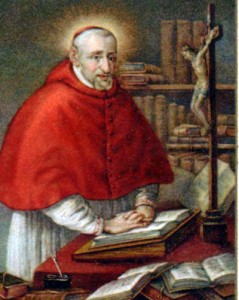 did not, in fact, prevent him from striving daily after sanctity through faithfulness to the requirements of his condition as religious, priest and bishop. … His preaching and catechesis reveal that same stamp of essentiality which he learned from his Jesuit education, being entirely focused on concentrating the power of the soul on the Lord Jesus, intensely known, loved and imitated”.
did not, in fact, prevent him from striving daily after sanctity through faithfulness to the requirements of his condition as religious, priest and bishop. … His preaching and catechesis reveal that same stamp of essentiality which he learned from his Jesuit education, being entirely focused on concentrating the power of the soul on the Lord Jesus, intensely known, loved and imitated”.
In another of his books, “De gemitu columbae” in which the Church is represented as a dove, Robert Bellarmine “forcefully calls clergy and faithful to a personal and concrete reform of their lives, in accordance with the teachings of Scripture and the saints. … With great clarity and the example of his own life, he clearly teaches that there can be no true reform of the Church unless this is first preceded by personal reform and conversion of heart on our part”.
“If you are wise, then understand that you were created for the glory of God and for your eternal salvation”, said the Pope quoting from one of the saint’s works. “Favourable or adverse circumstances, wealth and poverty, health and sickness, honour and offence, life and death, the wise must neither seek these things, nor seek to avoid them per se. They are good and desirable only if they contribute to the glory of God and to your eternal happiness, they are bad and to be avoided if they hinder this”.
The Pope concluded: “These words have not gone out of fashion, but should be meditated upon at length in order to guide our journey on this earth. They remind us that the goal of our life is the Lord. … They remind us of the importance of trusting in God, of living a life faithful to the Gospel, and of accepting all the circumstances and all actions of our lives, illuminating them with faith and prayer”.
Published by VIS – Holy See Press Office
Tags: catholic, catholic podcast, catholic prayer, cathollc spirituality, doctor of the church, spiritual exercises, st robert bellarmine
This entry was posted on Wednesday, February 23rd, 2011 at 8:54 am
You can follow any responses to this entry through the RSS 2.0 feed.
VATICAN CITY, 9 FEB 2011 (VIS) – Benedict XVI dedicated his catechesis during this morning’s general audience to St. Peter Canisius, whom Leo XIII proclaimed as “the second apostle of Germany”, and who was subsequently canonised and proclaimed as a Doctor of the Church by Pius XI in 1925.
Born at Nijmegen in the Netherlands in 1521, Peter Canisius entered the Society of Jesus in 1543 and was ordained a priest in 1546. In 1548, St. Ignatius of Loyola sent him to complete his spiritual formation in Rome. A year later he moved to the Duchy of Bavaria where he became dean and rector of the University of Ingolstadt. Later he was administrator of the diocese of Vienna, Austria, where he practiced his pastoral ministry in hospitals and prisons. In the year 1566 he founded the College of Prague and, until 1569, was the first superior of the Jesuit province of upper Germany.
In this role he created a network of Jesuit communities in Germanic countries, especially schools, which became starting points for the Catholic Reformation. He participated in religious discussions with Protestant leaders, including Melanchthon, held in the city of Worms, acted as pontifical nuncio to Poland, participated in the two Diets of Augsburg in 1559 and in 1565, and attended the closing session of the Council of Trent. In 1580 he retired to Fribourg in Switzerland where he dedicated himself to writing and where he died in 1597. Peter Canisius also edited the complete works of Cyril of Alexandria and of St. Leo the Great, and the Letters of St. Jerome.
Among his most famous works were his three “Catechises”, written between 1555 and 1558. The first was aimed at students capable of understanding the basic notions of theology; the second at ordinary young people for their primary religious education; and the third at children with a medium- or secondary-school education.
“One characteristic of St. Peter Canisius”, said the Holy Father, was “that he was able to harmonise fidelity to dogmatic principles with the respect due to each individual. … In a historical period of deep confessional contrasts, he avoided severity and the rhetoric of anger, something fairly rare in discussions among Christians at that time, … and sought only to explain our spiritual roots and to revitalise faith in the Church”.
“In the works destined for the spiritual education of the masses, our saint insists on the importance of the liturgy, … the rites of Mass and the other Sacraments. However, at the same time, he is careful to show the faithful the importance and beauty of individual daily prayer to accompany and permeate participation in the Church’s public worship”, said Benedict XVI, pointing our that “this exhortation and this methodology maintain all their value, especially after being authoritatively re-presented by Vatican Council II”.
Peter Canisius “clearly teaches that apostolic ministry is incisive and produces fruits of salvation in people’s hearts only if the preacher is a personal witness of Jesus and knows how to become His instrument, closely bound to Him through faith in His Gospel and in His Church, through a morally coherent life and incessant prayer”. AG/VIS 20110209 (530)
Tags: catholic, catholic podcast, catholic prayer, cathollc spirituality, doctor of the church, jesuits, pope benedict xvi, society of jesus, st peter canisius
This entry was posted on Wednesday, February 9th, 2011 at 9:13 am
You can follow any responses to this entry through the RSS 2.0 feed.
Born of wealthy polytheistic, pagan nobility, Hilary’s early life was uneventful as he married, had children (including Saint Abra), and studied on his own. Through his studies he came to believe in salvation through good works, then monotheism. As he studied the Bible for the first time, he literally read himself into the faith, and was converted by the end of the New Testament.
Hilary lived the faith so well he was made bishop of Poitiers from 353 to 368. Hilary opposed the emperor’s attempt to run Church matters, and was exiled; he used the time to write works explaining the faith. His teaching and writings converted many, and in an attempt to reduce his notoriety he was returned to the small town of Poitiers where his enemies hoped he would fade into obscurity. His writings continued to convert pagans.
“Obtain, O Lord, that I may keep ever faithful to what I have professed in the symbol of my regeneration, when I was baptized in the Father, in the Son and in the Holy Spirit. That I may worship you, our Father, and with you, your Son; that I may deserve your Holy Spirit, who proceeds from you through your Only Begotten Son… Amen”
Tags: blessed trinity, catholic, catholic podcast, catholic prayer, cathollc spirituality, doctor of the church, father of the church, st. hilary of poiters
This entry was posted on Thursday, January 13th, 2011 at 12:27 am
You can follow any responses to this entry through the RSS 2.0 feed.
 Here’s the other doctor of the Church of the 1200’s (are you familiar with his counterpart…hint: “Angelic Doctor”)
 Brilliant …simply brilliant…overshadowed in some ways by the great big figure of St. Thomas Aquinas (literallly and figuratively), a saint not to be missed. I simple don’t have what it takes to explain him here in my words. It’s so much easier to have Dr. R. R. Reno tell us about him; here is Professor R. R. Reno discussing with me the legacy of St. Bonaventure on show 6 of his Christian Apologetics…click here to listen   Â
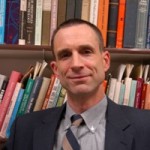 And what is really remarkable…Dr. Reno kind of looks like Bonaventure…go figure
And what is really remarkable…Dr. Reno kind of looks like Bonaventure…go figure
For more of Dr. R. R. Reno’s shows just click here
Tags: catholic, catholic podcast, catholic prayer, cathollc spirituality, doctor of the church, Professor R. R. Reno, st thomas aquinas, st. bonaventure
This entry was posted on Thursday, July 15th, 2010 at 12:01 am
You can follow any responses to this entry through the RSS 2.0 feed.

